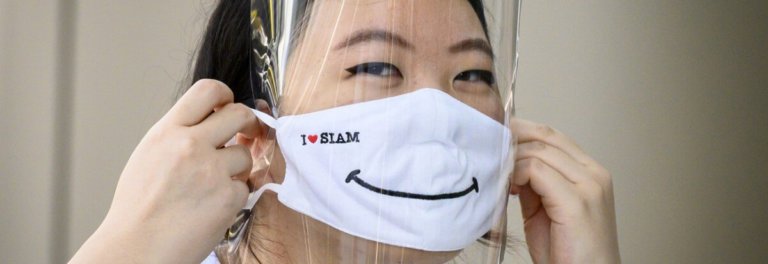
The face mask has become the quintissential symbol of the new normal. They could be made mandatory in your university next term — if they aren’t already.
Though they are made compulsory in UK public transportation, experts say they should also be worn in other public spaces. Some institutions will ask staff and students to wear masks and carry out sample COVID-19 tests next term, including Cardiff University.
“Even if they are not 100% effective, if everybody wears one, we know from other countries that it works,” said virologist professor Peter Piot. He was one of the scientists who discovered Ebola in the 70s, and was recently critically ill with COVID-19.

Palestinian students, wearing protective masks due to COVID-19, attend their final classes before graduation following the reopening of the Palestine Technical University in al-Aroub. Source: Hazem Bader/AFP
On the other hand, masks are already mandated by several US state governments. Emory University experts are urging government officials and business leaders in Georgia to do the same.
Over in Florida, the United Faculty of Florida union put out a comprehensive report for colleges to use as a guideline when reopening. They not only emphasise face masks on campuses, but also sanitation stations and comprehensive COVID-19 testing and tracing.
Face mask regulations are also sweeping Asia and the Middle East. In June, Alexandria University in Egypt became the first Middle Eastern academic institution to make them mandatory.
Why should I wear a face mask on campus?
There is a legal basis for mandatory masks, according to Lindsay Wiley, the director of American University’s Health Law and Policy Program.
Wiley spoke to NPR about that legal basis. 👇https://t.co/OI1LiKNdpl
— NPR (@NPR) June 28, 2020
Though the university can set social distancing measures and modify campus arrangements, upholding face mask policy is a responsibility shared by each student and staff.
A study from Texas A&M University found that not wearing a mask dramatically increases a person’s chances of being infected by the COVID-19 virus.
“By analysing the pandemic trends without face-covering using the statistical method and by projecting the trend, we calculated that over 66,000 infections were prevented by using a face mask in little over a month in New York City,” said lead researcher Renyi Zhang.
This led them to conclude that wearing a face mask in public spaces is the most effective means to prevent inter-human transmission.
Simply put, the more people wear masks, the lower the risk of COVID-19 transmission. This allows us to gradually return to campus activities during the pandemic.

Head of the Miroglio Atelier, Graziella Baldino checks a cotton mask at the Atelier Miroglio masks factory in Italy. Scientists say cotton masks are the safest and best for your skin. Source: Marco Bertorello/AFP
Which face mask is the best?
Though it is important, many are finding it hard to adapt to constantly wearing masks. For example, mask acne, which is a result of increased oil and sweat build-up in areas constantly rubbing against your mask.

A woman, wearing a face mask as a preventive measure against the spread of the COVID-19 novel coronavirus, gets her hair braided into dreadlocks outside a shopping centre in Bangkok on May 17, 2020. Source: Candida Ng/AFP
Thankfully, there are solutions.
- Use a cotton mask — Research out of Florida Atlantic University found that quilting cotton masks are most effective in blocking droplets. Coincidentally, dermatologists say that 100%-cotton masks are also best for your skin. Cotton lets the skin “breathe.”
- Wash your mask — Wash it as frequently as underwear, says Dr Candrice Heath, an assistant professor of dermatology at the Lewis Katz School of Medicine at Temple University. “You don’t want all of that oil and sweat and dirt to sit there and then you reapply it to your face constantly.”
- Care for your skin — If you haven’t already, it’s time to establish a basic skincare routine involving a gentle cleanser and a mild moisturiser. Use less make-up and minimise other products. Masks intensify product delivery to your skin, so less is more.
If wearing a mask puts you in serious health risk, you should discuss your options with your doctor. Otherwise, your university — and every other public space — is well within reason to ask that you wear a mask.
Here’s where being a team player counts.
Liked this? Then you’ll love…
CDC guidelines: 4 things to know about universities reopening in the US
3 tips for online learners going back to university campus







